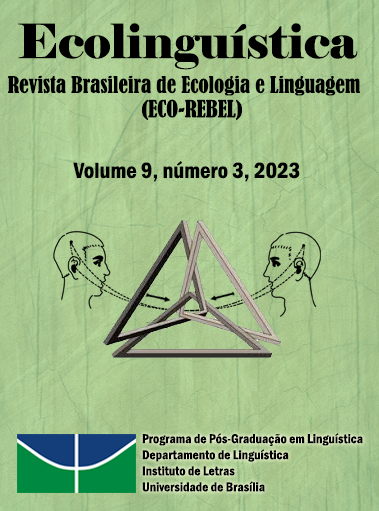Por uma gramática ecossistêmica do português brasileiro
Abstract
O objetivo deste longo artigo é apresentar algumas das primeiras ideias de um projeto maior para a elaboração de uma Gramática ecossistêmica do português (pelo primeiro autor) e uma Gramática do português rural de Major Porto (pela coautora), usando como base teórico-metodológica a versão da ecolinguística chamada linguística ecossistêmica (LE). A intenção não é repetir tudo que as gramáticas tradicionais vêm reproduzindo há séculos, mas voltar–se para fenômenos pouco, insuficientemente ou nunca investigados devidamente. Os fenômenos tradicionalmente estudados permanecerão como pressupostos. Partindo da concepção de língua como interação, serão apresentadas e discutidas algumas questões de gramática (sintaxe, morfologia, fonética-fonologia) como parte das regras que subjazem às interações comunicativas (as regras interacionais), privilegiando-se os fenômenos que têm sido considerados periféricos. Será mostrado que exclamações, interjeições e onomatopeias, e até meios não linguísticos, também podem aparecer nas interações comunicativas, portanto, são parte da língua-como-interação.
Downloads
Downloads
Published
How to Cite
Issue
Section
License

This work is licensed under a Creative Commons Attribution-NonCommercial-NoDerivatives 4.0 International License.
Authors who publish in this journal agree to the following terms:
Authors retain copyright and grant the journal the right of first publication. The work is simultaneously licensed under the Creative Commons Attribution License allowing the sharing of the work with acknowledgment of the authorship of the work and initial publication in this journal.
Authors are authorized to enter into additional contracts separately for non-exclusive distribution of the version of the work published in this journal (e.g., publishing in institutional repositories or as book chapters), with acknowledgment of authorship and initial publication in this journal.
Authors are allowed and encouraged to post and distribute their work online (e.g., in institutional repositories or on their personal page) at any point before or during the editorial process, as this can bring about productive revisions as well as increase impact.
Citation of published works (See The Effect of Free Access).



3.png)



